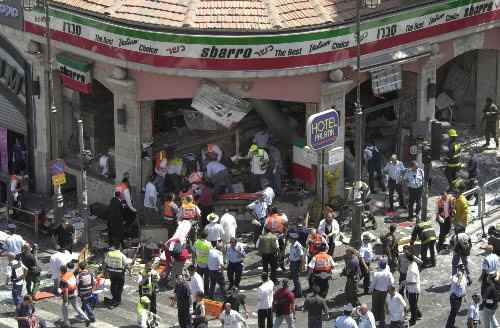FACT: Terrorism is never an acceptable option for any group of people in any conflict or dispute. In this case, the Palestinian-Arab leadership has had numerous other options, but it has proven each time to choose violence and terrorism over wanting peace. See “MYTH: The Palestinian Authority is Moderate and Seeks Peace” and “MYTH: Israel Does Not Want to Make Peace with the Palestinian-Arabs” to learn more about the many options the Palestinian-Arab leadership has to obtain peace, including accepting Israel’s numerous peace offers, ending violent and anti-Semitic incitement, and more.
In addition to having numerous peaceful options, the Palestinian-Arab leadership actually hinders the chance of bettering its people’s lives by resorting to terrorism. When the Palestinian-Arabs resort to terrorism against civilians, Israel is forced to enact new measures to prevent these attacks and protect its people. Some of these measures include common-sense security tactics, such as checkpoints and a security barrier, which inconvenience some Palestinian-Arabs.
Moreover, when Palestinian-Arab leaders run large terror campaigns, Israel is forced to respond by fighting these terrorists. Since most Palestinian-Arab terrorists commit the war crime of using their civilians as human shields, their civilians are commonly caught in the crossfire. Overall, the use of terrorism as a tactic against Israel only leads to more restrictive measures against Palestinian-Arabs.
On the contrary, when Palestinian-Arab leaders cease terrorist activities, Israel is able to relieve its security measures, which eases the lives of Palestinian-Arab civilians. Furthermore, when terrorism decreases, the economic situation for Palestinian-Arabs improves, as they are able to find better jobs in Israel and make more money for their families. Furthermore, Israel takes down most of its checkpoints in Judea and Samaria when terrorism declines.
To illustrate this reality, as terrorism decreased in 2009, the economy in Judea and Samaria (the “West Bank”) drastically improved. Then Deputy Chairman of the Chamber of Commerce of Nablus, Omar Hashim, said of the improved economic situation, “Traders here are satisfied. Their sales are rising…there is a strong sense of optimism.” Olfat Hammad, the Associate Director of the Palestinian Center for Policy and Survey Research, said, “You can feel the movement.”
The Palestinian-Arab leaders have more of a say than Israel in what goes on in the Palestinian Authority (PA). The PA controls all aspects of domestic life in all major Palestinian-Arab population centers. When it chooses to act peacefully, history shows that life improves for the Palestinian-Arabs. When it chooses to act violently, history shows that the economy sinks and Israel is forced to enact extra security measures that lead to inconveniences for Palestinian-Arabs.
Overall, terrorism deludes Palestinian-Arabs and undercuts their growth; it even leads to many fatalities, as they are used as human shields by Palestinian-Arab terrorists. Simply put, terrorism makes Palestinian-Arab life worse, while peaceful initiatives improve their economy and quality of life.












